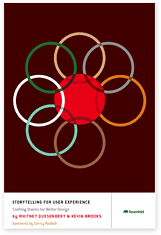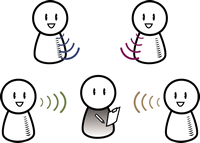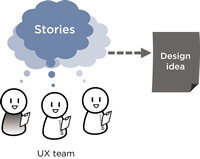Storytelling for User Experience
Crafting stories for better design
by Whitney Quesenbery and Kevin Brooks
 We all tell stories. It's one of the most natural ways to share information, as old as the human race. This book is not about a new technique, but how to use something we already know in a new way. Stories help us gather and communicate user research, put a human face on analytic data, communicate design ideas, encourage collaboration and innovation, and create a sense of shared history and purpose. We all tell stories. It's one of the most natural ways to share information, as old as the human race. This book is not about a new technique, but how to use something we already know in a new way. Stories help us gather and communicate user research, put a human face on analytic data, communicate design ideas, encourage collaboration and innovation, and create a sense of shared history and purpose.
This book looks across the full spectrum of user experience design to discover when and how to use stories to improve our products. Whether you are a researcher, designer, analyst or manager, you will find ideas and techniques you can put to use in your practice.
If you...
- Need to share research and design insights in a compelling and effective way
- Struggle to communicate the meaning of a large body of data in a way that everyone just "gets"
- Want to explore a new, innovative idea, and imagine its future
... this book can help you, by showing you how and when to choose, create and use stories.
You might be surprised at how many different ways you can use stories in your UX work to make it more persuasive and compelling. Lots of UX practices have storytelling at their root...we just don't always call them "stories"

Storytelling starts with listening. In formal and informal user research, make time for people to tell you their story. You might be surprised at how many great stories (or story fragments) you'll collect if you let them. Just say "Tell me about that" when you hear the start of a juicy story.
One definition of a culture is a group of people who share stories. When people tell you similar stories, maybe they are also telling you something about how they relate to your product and to each other.
This might just be the beginning of a great story for a persona.

Put some stories together and you might have the spark of a design idea. Maybe you call them user stories, or scenarios, but they are all ways of thinking through not just what will happen, but how the characters (... your audience or users) will react to the experience.
And finally, what's a usability test task, except a story for the participant to finish. Make it dramatic or matter-of-fact, but tell a story that launches them into a situation they want to solve or an experience they want to explore.
|

